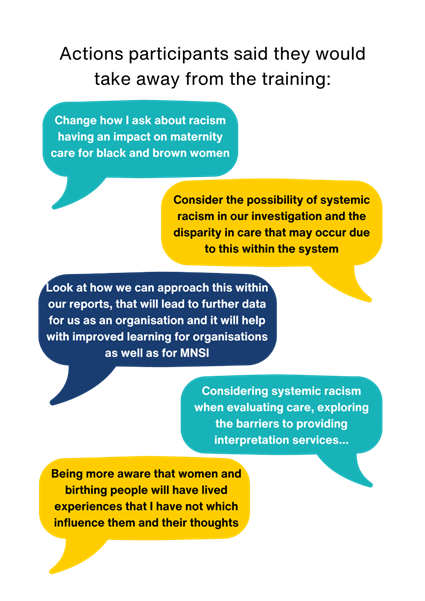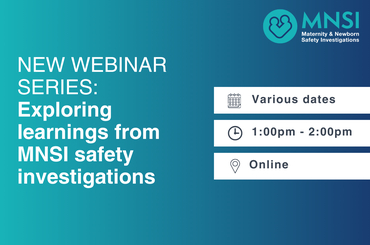In a world where diversity and inclusion are paramount, the journey towards a more equitable society begins with education and awareness. The theme for this year’s International Women's Day (8 March) is ‘inspire inclusion’, so it's timely to reflect on the steps we’re taking to inspire inclusivity within our investigative practices. Through a tailored training programme delivered by Birthrights, a UK charity dedicated to protecting human rights in pregnancy and childbirth, the MNSI team embarked on a transformative learning experience that has inspired them to embrace inclusivity in their work.
The training sessions, meticulously designed by Birthrights, aimed to empower the MNSI team to understand human rights and systemic racism in maternity care. By centring the experiences of Black and Brown women, birthing people, and families, the programme sought to instil a deeper appreciation for the lived realities of individuals who may face unique challenges within the healthcare system.
As we celebrate International Women's Day, it's essential to recognise the intersectionality of gender, ethnicity, and healthcare outcomes. MNSI's commitment to examining systemic issues like racism in maternity care aligns with our commitment to improving outcomes for all women and babies, regardless of ethnicity or heritage. This imperative arises from the statistic that Black women in the UK have a mortality rate almost four times higher than that of White women. That Black and minority ethnic women continue to experience higher rates of maternal and neonatal mortality, is often attributed to complex social, economic, and healthcare system factors as well as systemic racism.
Addressing this disparity necessitates strategies that address structural inequalities, improve access to quality care, and prioritise culturally competent approaches within maternity services. By advocating for systemic changes and emphasising the importance of culturally sensitive care, MNSI is playing a crucial role in advancing equity and improving maternal health outcomes for all women and birthing people in England.
One of the key takeaways from the training was the recognition of the diverse lived experiences that influence individuals' thoughts and behaviours. Our team acknowledged the importance of approaching investigations with a heightened awareness of the structural barriers that certain groups may encounter. This perspective has prompted the team to ask more nuanced questions, particularly regarding the impact of racism on care and the disparities that exist within the healthcare system.
Moreover, the training encouraged the MNSI team to consider the possibility of systemic racism in our own investigations and to explore the barriers that may hinder the provision of equitable care. By delving into topics such as human rights in childbirth and systemic racism, we are equipping our team with the knowledge and tools necessary to identify and address instances of discrimination and injustice within their work.
The feedback from the team following the training was overwhelmingly positive, with 94% expressing that the sessions had enhanced their understanding of how human rights apply to maternity care. Many highlighted the importance of ongoing education on racism and the need for all professionals to engage in such critical discussions. The training not only provided a platform for learning but also facilitated open dialogue, idea-sharing, and the sharing of diverse experiences.
Team members also emphasised the need for continued support and resources to deepen their understanding and navigate complex issues related to human rights and systemic racism. By providing access to additional reading materials, guidance on framing questions, and ongoing organisational support, Birthrights and MNSI are fostering a culture of continuous learning and growth among the MNSI team.
As the MNSI team reflects on their training experience, they recognise the transformative impact it has had on their approach to investigations. By centring lived experiences, challenging existing biases, and advocating for inclusivity, these dedicated professionals are paving the way for a more equitable and respectful maternity care system.
In conclusion, the journey towards inclusion is not a destination but a continuous process of learning, unlearning, and growth. Through initiatives like the training programme delivered by Birthrights, organisations like MNSI are taking proactive steps to inspire inclusion, foster diversity, and champion human rights in every aspect of their work. As we celebrate these efforts, let us remember that true progress lies in our collective commitment to creating a world where everyone is seen, heard, and valued.

Related news
Safety Spotlight: Delayed escalation in abnormal CTGs
Introducing COMPASS: A new safety tool to help understand the impact of culture on patient safety
Safety Spotlight: Prescribing and dispensing of low molecular weight heparin
